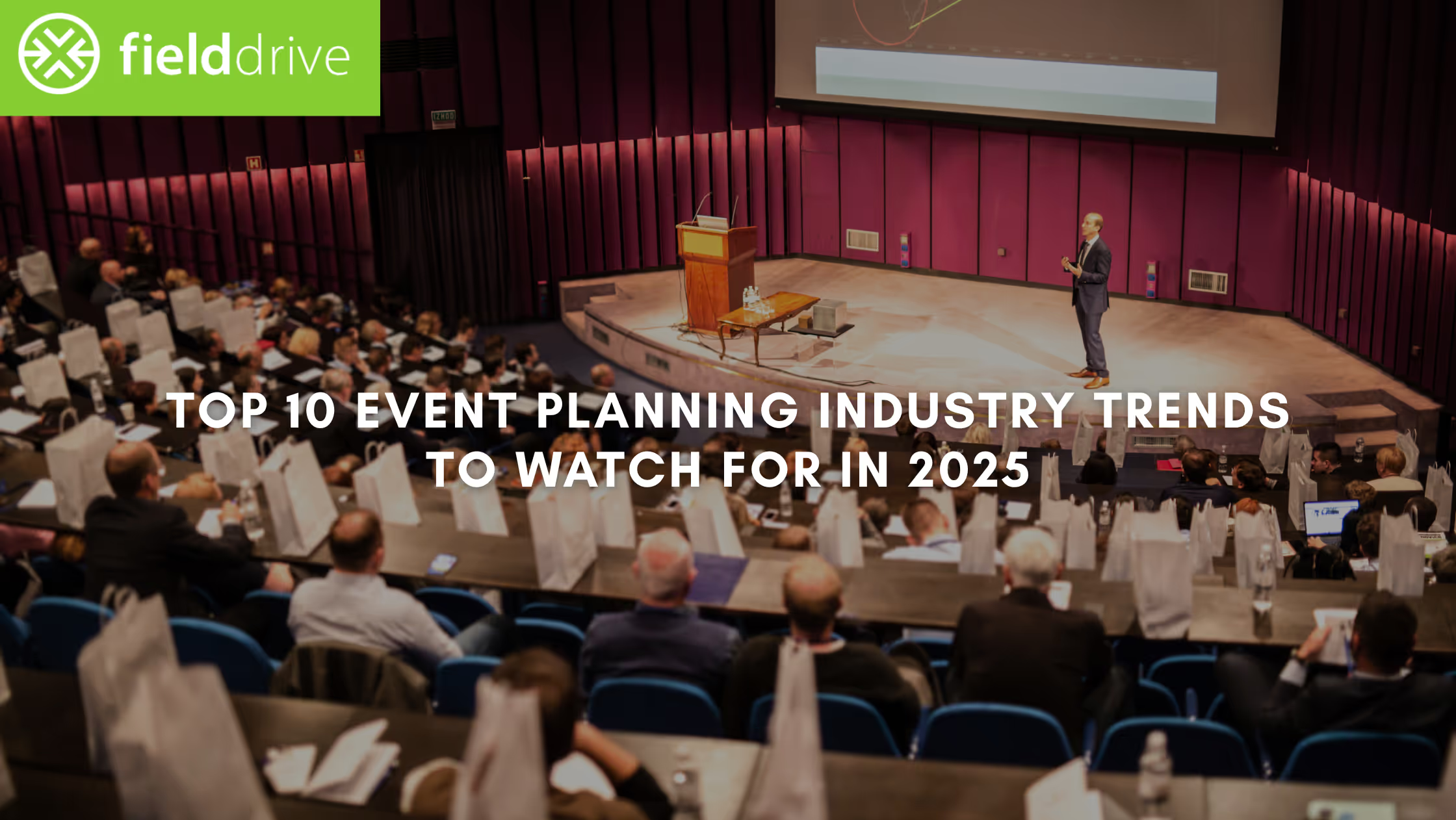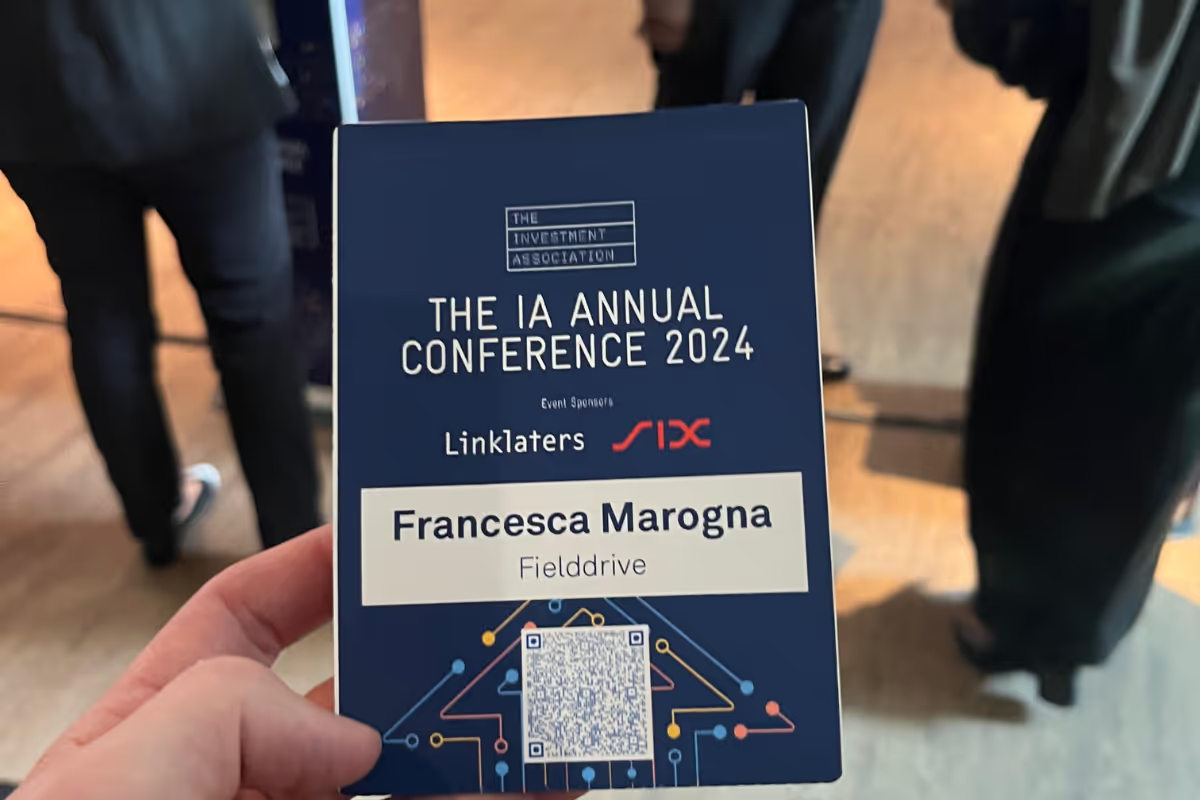Top 10 Event Planning Industry Trends to Watch for in 2025
Explore the top 10 event planning industry trends for 2025. Stay ahead with insights into the latest trends shaping the future of event planning.

CONTENT
Are you ready to stay ahead of the curve in 2025 with the latest trends shaping the event planning industry? The global events market is expected to reach $2.5 trillion by 2035, growing at a solid 6.8% annually, driven by increasing demand for personalized experiences, technological advancements, and hybrid event formats. With such growth, the demand for fresh and innovative event planning strategies is higher than ever.
As event planners, you’re not just organizing logistics – you're building experiences that truly engage attendees. In this guide, we'll break down the key event planning trends for 2025. These insights will help you refine your approach, adapt to changing expectations, and make smarter decisions moving forward.
TL;DR
- Event planners are adopting AI-powered personalization to enhance attendee experiences with tailored content and real-time engagement.
- Multi-format events are evolving, with in-person, hybrid, and virtual formats combining to maximize accessibility and audience participation.
- Data utilization is at the forefront, with planners leveraging insights to optimize event planning and improve future strategies.
- Sustainability and AR/VR technologies are becoming core components of event planning, providing an exceptional experience with eco-friendly practices.
- Self-serve technology is gaining traction, giving event organizers more control over logistics, content, and attendee management.
Fundamentals of Event Planning
Before diving into the top trends, it’s important to grasp the core elements that define successful event planning. We understand that organizing an event can be overwhelming, but mastering these fundamentals will help you build a solid foundation. These essentials ensure events are executed smoothly and effectively, setting the stage for innovation.
- Audience-Centric Focus: Prioritize attendee engagement with personalized content and experiences.
- Event Management Software: Utilize event technology and tools to help with registrations, ticketing, scheduling, and attendee communication, streamlining the entire process.
- Online Registration Systems: These systems automate sign-ups, confirmations, and data collection, giving planners insights into attendee preferences and behavior.
- Badge Printing: On-demand badge printing streamlines check-in by allowing instant creation of personalized attendee badges.
- Self-Check-In: Self-check-in stations or mobile check-in apps reduce wait times and improve event flow by enabling attendees to check in quickly and efficiently.
- Live Streaming & Virtual Platforms: Allow organizers to seamlessly host virtual and hybrid events, expanding reach to global audiences.
- Networking Tools: Event-specific networking platforms help attendees connect, whether through virtual matchmaking, in-person icebreakers, or group chats.
- Budget Management: Balance resources efficiently to maximize event impact while staying within budget.
- Vendor Coordination: Collaborate closely with vendors to ensure seamless event logistics.
- Post-Event Review: Collect feedback and assess performance to refine future events.
These buildings help in understanding how the event industry is evolving and embracing new trends in 2025. Let’s discuss these trends in the next section.
Top 10 Event Planning Industry Trends of 2025
Staying ahead of rapid changes in the event planning industry, driven by evolving attendee expectations and technological innovations, is essential for creating memorable and impactful experiences in 2025.
In this section, we’ll dive into the top 10 trends shaping the event planning industry, so you can stay ahead of the curve and create events that leave a lasting impression. Let’s explore what’s next for the world of events!
Trend #1: The Rise of Personalization in Event Planning
Personalization is no longer just a buzzword; it's a necessity. With 71% of consumers expecting personalized experiences and 76% feeling frustrated when those expectations aren’t met, it’s clear that the future of event planning hinges on creating tailored, meaningful experiences. In 2025, personalization sets the stage for how events are crafted and experienced, making it a crucial trend to embrace.
How to Use Personalization in Your Events
To truly leverage the power of personalization, consider these areas where you can tailor your event experiences:
- Personalized Agendas: Allow attendees to curate their schedule based on their interests, ensuring they attend the most relevant sessions.
- Networking: Use matchmaking tools to help attendees connect with like-minded individuals, optimizing their networking experience.
- Customized Content: Deliver personalized content through event apps or emails based on attendee behavior or preferences.
- Targeted Communication: Send tailored messages before, during, and after the event to enhance engagement and provide valuable information.
- Post-Event Personalization: Follow up with personalized summaries or takeaways based on attendee participation and interaction during the event.

Trend #2: Event Planning Gets Smarter with AI
In 2025, AI is transforming event planning, with 45% of event organizers and directors already using AI tools to streamline operations and deliver bespoke attendee experiences.
AI in event planning enhances efficiency and personalization by automating tasks, analyzing data, and improving attendee engagement, setting the foundation for advanced applications like sentiment analysis and facial recognition.
It improves everything from event logistics to attendee interactions. Now, let’s explore how you can use AI to enhance your events.
How to Use AI to Enhance Your Events
- AI-Powered Matchmaking: AI connects attendees with similar interests, boosting networking opportunities and ensuring valuable connections are made.
- Compelling Content: AI recommends sessions, speakers, or exhibitors to attendees based on their preferences, creating a tailored event experience.
- Simplified Event Analytics: AI tracks real-time performance, providing insights into engagement, session popularity, and overall success to inform adjustments.
- Automating Admin Tasks: AI automates registration, scheduling, and follow-ups, freeing up planners to focus on the event’s creative elements.
- Sentiment Analysis with Facial Recognition: Sentiment analysis utilizes AI algorithms to analyze attendees’ facial expressions and emotional cues during sessions. It offers real-time insights that help organizers adjust event elements to boost engagement and satisfaction
This allows organizers to adjust the event dynamically to improve attendee satisfaction. fielddrive’s robust facial recognition technology boosts attendee engagement and enhances the check-in experience in real-time.
Trend #3: Multi-Format Events: In-Person, Hybrid, and Virtual

As the demand for flexible and inclusive event experiences grows, 77.2% of attendees appreciate the ease of joining virtual events. However, only 1% of attendees exclusively prefer online events over in-person experiences. This highlights the importance of offering multi-format events that cater to diverse preferences.
The growing popularity of hybrid, virtual, and in-person events serves as a strategic approach to engaging audiences, expanding reach, and optimizing resource use.
Why Multi-Format Events Matter:
- Broader reach: Catering to both in-person and online audiences ensures you’re reaching a larger, more diverse crowd.
- Increased engagement: Mixing formats allows attendees to engage in the way that suits them best, whether in person or remotely.
- Flexibility: It gives attendees the freedom to choose how they participate, which boosts satisfaction and retention.
- Cost-efficiency: Multi-format events allow for lower travel, venue size, and logistics costs while still providing a rich experience.
Best Practices for Multi-Format Events
- Seamless Integration Across Formats: Ensure that all event formats (in-person, hybrid, and virtual) are smoothly integrated with consistent content, themes, and messaging across all platforms.
- Interactive and Engaging Content: Use live polling, Q&A, and chat features to engage virtual and in-person audiences. Interactive content boosts participation and interaction.
- Real-Time Networking Opportunities: Incorporate virtual networking lounges and hybrid meet-and-greet sessions to bridge the gap between in-person and online attendees and promote valuable connections.
- Tailor Content for Both In-Person and Virtual Audiences: Customize content to engage both in-person and virtual attendees, ensuring that each group feels valued and included. Different formats may require different engagement strategies.
- Make Your In-Person Event Content Available Online: Ensure that in-person event content, such as keynotes or presentations, is accessible online for remote attendees or post-event viewing. This extends the event's reach and provides ongoing value.
Trend #4: Data Still Reigns Supreme
Data is essential in event planning as it allows planners to track attendee behavior and engagement metrics throughout the event lifecycle. It empowers them to make informed decisions that optimize experiences, refine strategies, and achieve improved outcomes.
Here’s why data is essential for your event success:
- Improves Personalization: Data allows you to tailor event experiences to individual preferences, ensuring more meaningful engagement and satisfaction.
- Measures ROI: Tracking attendee behavior and feedback helps calculate the return on investment, proving event value to stakeholders.
- Identifies Key Trends: Analyzing event data allows you to spot trends, optimize future events, and stay ahead of audience expectations.
- Fosters Real-Time Adjustments: Live data enables quick changes to event flow, ensuring real-time improvements during the event for a seamless experience.
How to Use Data to Shape Event Success
- Capture Valuable First-Party Data: Utilize attendee registration and engagement data to create segmented marketing strategies and drive better engagement.
- Analyze Attendee Behavior: Gather insights on attendee preferences, session engagement, and networking activity to improve event content and structure.
- Track Sentiment: Use sentiment analysis to understand attendee emotions and adjust the event experience accordingly, ensuring better engagement.
- Focus on Data Privacy: With tightening data regulations, ensure all collected data is gathered with consent and complies with industry standards for privacy.
Trend #5: Sustainability Takes Center Stage in Event Planning
As sustainability becomes a priority for many industries, event planning is following suit. A focus on eco-friendly practices is no longer just a trend; it’s a necessity. In fact, 86% of event professionals claim a sustainability target for their events this year, and 77% willing to track event/attendee carbon footprint. Here are some ways to ensure your events are both impactful and environmentally responsible:
Best Sustainable Practices for Your Events
- Reduce waste by opting for digital materials: Go paperless with event agendas, brochures, and marketing materials to minimize waste.
- Choose venues that prioritize sustainability. Look for locations with eco-friendly certifications and energy-efficient practices, such as solar power and water conservation.
- Promote sustainable transportation options: Encourage carpooling, ride-sharing, and the use of public transport to reduce your event’s carbon footprint.
- Sustainable badges and materials: Implement sustainable badges and reusable name tags to reduce paper or plastic waste.
- Leverage technology for efficiency: Use platforms like fielddrive for touchless check-in, sustainable badges, and instant badge printing, reducing paper usage and enhancing event flow.
- Offer plant-based or local menus: Incorporate plant-based meals or locally sourced food to reduce food waste and support sustainable practices.
Trend #6: Self-Serve Technology for Taking Control of Your Events
In 2025, event planners demand more control over their event setup without relying on tech vendors for every change. Self-serve event platforms provide user-friendly dashboards and tools that enable planners to build websites, customize schedules, manage registrations, and track sessions without technical support.
What You Can Manage With Self-Serve Technology
- Event Website Creation: Easily build and customize your event website without waiting for tech support, from adding copy to managing registration forms.
- Attendee Check-In: Use self-serve check-in systems like fielddrive to manage attendee arrivals efficiently, minimizing wait times and increasing event flow.
- Mobile App Setup: Create and customize your event app, offering attendees easy access to schedules, session info, and networking opportunities.
- Real-Time Updates: Instantly make updates to event details, from speaker changes to session adjustments, giving you full control over the event’s schedule.

Trend #7: High Demand for Instant Badge Printing

As events continue to grow in scale, the demand for efficient on-demand badge printing has surged. In 2025, attendees expect a smooth, quick check-in process, and instant badge printing plays a key role in making this happen. With solutions like fielddrive, event planners can offer real-time badge creation, ensuring attendees get their credentials without the hassle of long wait times.
Best Practices for Instant Badge Printing
- Seamless Integration: Use platforms like fielddrive that integrate badge printing into the registration process, minimizing wait times and errors.
- Customization: Create customized badges, ensuring they reflect their interests, roles, or sessions they are attending.
- Quick Setup: Have badge printing stations set up at multiple locations within the venue to prevent crowding and ensure fast distribution.
- Real-Time Updates: Keep badge data synced across all systems, so any last-minute changes in attendee details or session access are reflected instantly.
Trend #8: Smart Lead Capture Tools Are Becoming the New Norm
In 2025, smart lead capture tools are revolutionizing the way event organizers engage with attendees. Gone are the days of manual data entry and inefficient lead tracking. With AI-powered systems and seamless integrations, lead capture has become faster and more efficient, helping you gather valuable data and insights for future engagement.
How to Use Lead Capture Tools for Maximum Impact
- Use Digital Forms and Scanners: Leverage tools to capture attendee details in real-time using QR codes or NFC-enabled badges for quicker registration and engagement.
- Track Engagement Automatically: Set up tools that monitor attendee behavior during the event—track session attendance, interactions at booths, and networking participation to gather deeper insights.
- Sync Data Across Platforms: Ensure that your lead capture tool syncs with your CRM and event management systems for seamless follow-up and easy access to attendee information.
- Segment Leads for Targeted Follow-Up: Use the captured data to segment leads based on interests, industry, or behavior, enabling you to send highly compelling follow-up communications.
- Analyze Performance in Real-Time: Monitor lead data throughout the event to make real-time adjustments, ensuring you capture the most valuable interactions and insights.
Trend #9: Activity-Based Experiential Events Are Exploding
Experiential events are immersive, interactive experiences designed to boost attendee engagement by allowing them to participate and connect with the event's theme or brand. As the study predicts a 63% rise in event planning, with 70% planning to increase their budgets and focus on experiential events, it’s clear: audience engagement is now a priority.
In 2025, people are craving more interactive and immersive experiences that go beyond passive participation. With experiential events on the rise, planners are shifting from traditional events to more hands-on, participatory experiences.
Best Practices for Organizing Experiential Events
- Engage Attendees with Interactive Activities: Offer attendees opportunities to directly participate, whether through games, contests, or hands-on workshops. This keeps energy levels high and boosts engagement.
- Foster Networking through Fun: Incorporate activities like team-building games or social mixers, where attendees can network while participating in fun, non-traditional settings. This ensures that connections happen organically.
- Curate Unique Event Themes: Design event formats that cater to specific interests. From corporate volleyball games to intimate concerts, tailor your event's activities to what your audience values most.
Trend #10 AR/VR Immersive Experiences Are Gaining Popularity

The event planning industry is experiencing a digital transformation where technology supports all phases of event management. From strategic planning to post-event review, it enables planners to increase productivity, simplify operations, and deliver impactful attendee experiences.
As we approach 2025, the demand for advanced technologies like AI, AR/VR, and data-driven solutions will also increase. The augmented reality market is estimated to reach USD 60.3 billion by 2029, with a remarkable growth rate of 40.7%.
As the technology rapidly gains traction, its integration into events becomes increasingly prevalent. AR and VR are transforming how audiences experience both virtual and in-person events, providing interactive, 3D environments that captivate and engage attendees like never before.
How to Use AR/VR in Your Events
- Offer Virtual Site Tours: Allow attendees to explore event venues or exhibitions through AR. This virtual experience adds depth and context, helping participants feel more connected even before the event starts.
- Create Interactive Event Layouts: Use AR to provide attendees with dynamic event maps, allowing them to interact more engagingly with content, sessions, and exhibitors.
- Host Immersive Product Demonstrations: VR lets attendees experience your product or service firsthand at trade shows or expos, offering an engaging, risk-free environment to test new concepts.
- Gamify the Event Experience: Incorporating AR or VR-based games, scavenger hunts, or challenges can make events more fun and interactive, encouraging attendees to participate in networking and learning activities actively.
Embracing these trends will make your events memorable, impactful, and aligned with attendee expectations.
Revolutionize Your Events in 2025 with fielddrive
In 2025, creating seamless and efficient event experiences will be more important than ever. fielddrive helps event planners elevate their events through cutting-edge technology that enhances both attendee engagement and operational efficiency. From faster check-ins to streamlined lead capture, fielddrive offers a suite of powerful tools designed to make every event a success.
Key Features of fielddrive:
- Touchless Check-In: Simplify entry with touchless check-in using facial recognition or QR codes, reducing wait times and enhancing attendee experience.
- On-Demand Badge Printing: Easily print personalized badges in seconds, ensuring a smooth registration process without delays or confusion.
- Smart Lead Retrieval: Capture and track valuable lead information effortlessly, enabling exhibitors and planners to follow up and drive business opportunities post-event.
- Session Tracking & Access Control: Use session scanning technology to track attendance and manage access, ensuring only authorized individuals attend specific sessions.
- Real-Time Analytics: Monitor attendee behavior, session engagement, and other key metrics with live data, allowing for instant adjustments and more informed decision-making.
- Seamless Integration: fielddrive integrates effortlessly with your existing event management systems, providing a unified solution for registration, data syncing, and event execution.
fielddrive's advanced technology gives you complete control over your event's success, helping you focus on creating exceptional experiences while streamlining all aspects of event management.
Conclusion
As the event industry continues to evolve in 2025, embracing the latest trends—from personalization to AI and sustainability—will be key to staying ahead. With new technologies driving innovation, it’s crucial to leverage tools that streamline operations and enhance attendee experiences.
fielddrive is here to help you do just that. With its powerful suite of features like touchless check-ins, on-demand badge printing, and smart lead retrieval, you can effortlessly transform the way you manage and experience events.
Explore how fielddrive revolutionize your event planning process. Request a free demo today!
Frequently Asked Questions
What is the future of event planning?
The future of event planning lies in increased personalization, AI-driven solutions, and hybrid event formats. Sustainability, smart tech, and immersive experiences will shape the industry's landscape moving forward.
Is event planning in high demand?
Yes, event planning is in high demand. As businesses and individuals seek more memorable, engaging experiences, the need for skilled event planners continues to rise, with new opportunities in both the corporate and private sectors.
What kind of event planners make the most money?
Event planners specializing in large-scale corporate events, weddings, or high-profile conferences make the most money. Experience, specialization, and industry demand significantly impact earning potential.
What is the future outlook for event planners?
The outlook for event planners is promising, with the industry expected to grow steadily. As businesses adopt more tech-driven solutions and hybrid events become the norm, planners with expertise in these areas will continue to be in demand.
Want to learn how fielddrive can help you elevate your events?
Book a call with our experts today



.png)
.svg)
.svg)
.svg)

.svg)